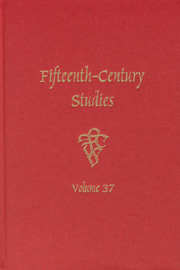Book contents
- Frontmatter
- Contents
- Essays
- Tradition and Innovation in 15th and 16th Century Popular Song Poetry: From Oswald von Wolkenstein to George Forster
- The Poet at the Mirror: René d'Anjou and Authorial Doubling in the Livre du Cœur d'Amour épris
- Modern Translator or Medieval Moralist?: William Caxton and Aesop
- A Battle of “Trechour Tung[s]”: Gaelic, Middle Scots, and the Question of Ethnicity in the Scottish Flyting
- Wheels and Wycliffites: The Role of Sacred Images in Capgrave's The Life of Saint Katherine
- Sympathy for the Devil: Gilles de Rais and His Modern Apologists
- Milieu, John Strecche, and the Gawain-Poet
- Thinking on Paper: Reference Tools, Tables, and Diagrams in Conrad Buitzruss's Compendium (Clm 671)
- Book Reviews
A Battle of “Trechour Tung[s]”: Gaelic, Middle Scots, and the Question of Ethnicity in the Scottish Flyting
from Essays
Published online by Cambridge University Press: 05 February 2013
- Frontmatter
- Contents
- Essays
- Tradition and Innovation in 15th and 16th Century Popular Song Poetry: From Oswald von Wolkenstein to George Forster
- The Poet at the Mirror: René d'Anjou and Authorial Doubling in the Livre du Cœur d'Amour épris
- Modern Translator or Medieval Moralist?: William Caxton and Aesop
- A Battle of “Trechour Tung[s]”: Gaelic, Middle Scots, and the Question of Ethnicity in the Scottish Flyting
- Wheels and Wycliffites: The Role of Sacred Images in Capgrave's The Life of Saint Katherine
- Sympathy for the Devil: Gilles de Rais and His Modern Apologists
- Milieu, John Strecche, and the Gawain-Poet
- Thinking on Paper: Reference Tools, Tables, and Diagrams in Conrad Buitzruss's Compendium (Clm 671)
- Book Reviews
Summary
“Iersche brybour baird” (49) — translated “Gaelic vagabond minstrel” — forcefully commences William Dunbar's second invective against Walter Kennedy as dramatized within The Flyting of Dunbar and Kennedy. The flyting, a term originally used to describe a rowdy public quarrel in the Middle Ages, was a popular verse form in 15th- and 16th- century Scotland in which two poets would attempt to outwit each other in a series of vulgar denunciations. The debaters creatively manipulated the Middle Scots language by concocting vivid caricatures and lambasting one another to the delight of audiences. Yet Dunbar's words do more than throw down the gauntlet for an entertaining verse duel. His stinging gibe draws negative attention to Kennedy's Gaelic heritage, signaling that this game of insults has taken an ethnic turn. When Dunbar and Kennedy exploit typical flyting conventions to direct their jabs against each other's ethnic backgrounds, the gruff comedic game exposes quite serious gaps in the audience's understanding of what constitutes a “true” Scottish identity.
In order for readers to understand the nuances of Dunbar and Kennedy's attacks on late-medieval Scottish identity, one must examine the nationalistic elements of this genre. I would like to suggest that the flyting displays characteristics which foreground Scottish culture, delineating the audience as an exclusively Scottish one. The flyter speaks Middle Scots in its most colloquial form, relying heavily upon slang, vulgarity, and casual speech, thus deliberately limiting the audience to native speakers.
- Type
- Chapter
- Information
- Fifteenth-Century Studies 37 , pp. 71 - 96Publisher: Boydell & BrewerPrint publication year: 2012



